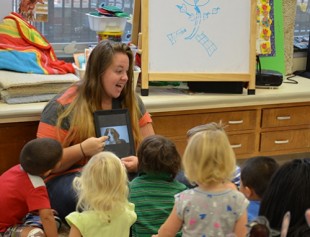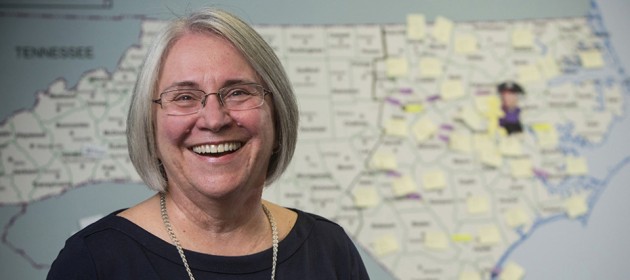Stewards of the Visual Exposition
Ready To Learn
Publisher's note: The author of this post, Kelly Setzer, is a contributor to ECU News Services.
Incoming kindergartners throughout eastern North Carolina will soon be better prepared for classroom learning thanks to a $1.3 million grant awarded to East Carolina University.
ECU's Department of Child Development and Family Relations was selected to receive the funding by the North Carolina Department of Health and Human Services (DHHS) to provide mentoring and evaluation to pre-kindergarten teachers in 46 counties in the region.
Barbara Brehm, coordinator of ECU's birth to kindergarten undergraduate program in the College of Human Ecology, will oversee the Early Educator Support, Leadership and Professional Development (EESLPD) project.
"What we have seen over and over again, and what the research shows, is that the more knowledgeable and intentional a teacher is in using developmentally appropriate practices with young children, the higher the outcomes are in social, emotional and academic domains of learning," Brehm said. "So, that's the goal. We want children to come to kindergarten ready to learn."
 Targeting four-year-olds at risk, the state-funded "NC Pre-K" program aims to ensure all kindergartners start their elementary years with a similar foundation. The Department of Public Instruction requires an assigned teacher to mentor and a principal to evaluate for all NC Pre-K classes as part of those efforts.
Targeting four-year-olds at risk, the state-funded "NC Pre-K" program aims to ensure all kindergartners start their elementary years with a similar foundation. The Department of Public Instruction requires an assigned teacher to mentor and a principal to evaluate for all NC Pre-K classes as part of those efforts.
This is a simple process for public schools, since all principals qualify as evaluators based on their hiring requirements, and there's also at least one qualified mentor teacher on staff by mandate.
But there are more than 500 non-public NC Pre-K programs in the eastern region alone. Licensed teachers at these schools have had to rely on the state for the required mentoring and evaluation, which led to an extensive waitlist from a lack of resources.
"DHHS is saying 'we need to be able to serve more teachers, we have way too many on the waiting list. And we think we can do it through institutes of higher education, rather than just the state government.' So our charge, our scope of work at ECU, is to serve all the teachers in the eastern half of the state," Brehm said.
"Every licensed birth through kindergarten teacher who is working in NC Pre-K programs, or some other early childhood programs that require licensed teachers, we're going to be serving those people."
Through the EESLPD funding, independent consultants will be hired, contracted, trained, supported and monitored out of ECU. They must possess specific credentials to be selected, and they will each be assigned a caseload of schools close to their home offices throughout eastern North Carolina.
 "The mentors will go out once or twice a month into the classrooms where they'll offer resources to improve the specific learning methods of the children being taught," Brehm said. "The evaluators go in four times a year to do an observation and rank the teacher on the state teaching standards."
"The mentors will go out once or twice a month into the classrooms where they'll offer resources to improve the specific learning methods of the children being taught," Brehm said. "The evaluators go in four times a year to do an observation and rank the teacher on the state teaching standards."
Debbie Saperstein has been a mentor-evaluator for NC Pre-K schools near Wilmington for three years under the old system. She says administration of these teacher support services through ECU should be much more effective because the consultants will be focused on one geographical area.
"And having the resources of ECU will help tremendously by making professional development more readily accessible to teachers and EESLPD staff," Saperstein said.
Funding for the project is renewable every two years and was split evenly with UNC Charlotte, which will offer similar services to early childhood teachers in the western half of the state.
The program will be monitored quarterly by DHHS to ensure success. The agency will also track the progress of the teachers using state teaching standards ratings.
"The greatest value of the mentor/evaluation process is really not for the teachers. The greatest value is to the students," Saperstein said. "(The students) benefit from the professional growth and excellence in teaching that result from the mentoring and evaluation process."

ECU Child Development and Family Relations instructor Barbara Brehm will oversee a newly-funded project that will provide mentoring and evaluation to pre-kindergarten teachers. Brehm is coordinator of ECU's birth through kindergarten undergraduate program. (Photo by Cliff Hollis)
Go Back
ECU to provide early childhood mentoring to eastern NC educators
Incoming kindergartners throughout eastern North Carolina will soon be better prepared for classroom learning thanks to a $1.3 million grant awarded to East Carolina University.
ECU's Department of Child Development and Family Relations was selected to receive the funding by the North Carolina Department of Health and Human Services (DHHS) to provide mentoring and evaluation to pre-kindergarten teachers in 46 counties in the region.
Barbara Brehm, coordinator of ECU's birth to kindergarten undergraduate program in the College of Human Ecology, will oversee the Early Educator Support, Leadership and Professional Development (EESLPD) project.
"What we have seen over and over again, and what the research shows, is that the more knowledgeable and intentional a teacher is in using developmentally appropriate practices with young children, the higher the outcomes are in social, emotional and academic domains of learning," Brehm said. "So, that's the goal. We want children to come to kindergarten ready to learn."

At ECU's Nancy Darden Child Development Center, educational activities teach children concepts that will help them succeed in kindergarten. A new ECU program will support pre-school teachers across eastern North Carolina through mentoring and evaluation, so that all children enter kindergarten with a good educational foundation. (Contributed photo)
This is a simple process for public schools, since all principals qualify as evaluators based on their hiring requirements, and there's also at least one qualified mentor teacher on staff by mandate.
But there are more than 500 non-public NC Pre-K programs in the eastern region alone. Licensed teachers at these schools have had to rely on the state for the required mentoring and evaluation, which led to an extensive waitlist from a lack of resources.
"DHHS is saying 'we need to be able to serve more teachers, we have way too many on the waiting list. And we think we can do it through institutes of higher education, rather than just the state government.' So our charge, our scope of work at ECU, is to serve all the teachers in the eastern half of the state," Brehm said.
"Every licensed birth through kindergarten teacher who is working in NC Pre-K programs, or some other early childhood programs that require licensed teachers, we're going to be serving those people."
Through the EESLPD funding, independent consultants will be hired, contracted, trained, supported and monitored out of ECU. They must possess specific credentials to be selected, and they will each be assigned a caseload of schools close to their home offices throughout eastern North Carolina.

Preschoolers at ECU's child development center listen attentively to an educational session about dinosaurs. (Contributed photo)
Debbie Saperstein has been a mentor-evaluator for NC Pre-K schools near Wilmington for three years under the old system. She says administration of these teacher support services through ECU should be much more effective because the consultants will be focused on one geographical area.
"And having the resources of ECU will help tremendously by making professional development more readily accessible to teachers and EESLPD staff," Saperstein said.
Funding for the project is renewable every two years and was split evenly with UNC Charlotte, which will offer similar services to early childhood teachers in the western half of the state.
The program will be monitored quarterly by DHHS to ensure success. The agency will also track the progress of the teachers using state teaching standards ratings.
"The greatest value of the mentor/evaluation process is really not for the teachers. The greatest value is to the students," Saperstein said. "(The students) benefit from the professional growth and excellence in teaching that result from the mentoring and evaluation process."

ECU Child Development and Family Relations instructor Barbara Brehm will oversee a newly-funded project that will provide mentoring and evaluation to pre-kindergarten teachers. Brehm is coordinator of ECU's birth through kindergarten undergraduate program. (Photo by Cliff Hollis)
| Census Day | East Carolina University, School News, The Region, Neighboring Counties | September Is Sickle Cell Awareness Month |





















